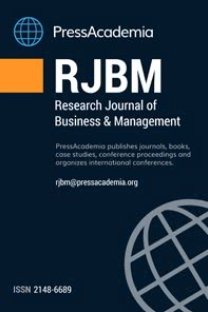AN EMPIRICAL ASSESSMENT ON ENVIRONMENTAL AWARENESS OF SCHOOL MANAGERS AND TEACHERS AS STAKEHOLDER OF PRIVATE SCHOOLS
Environmental awareness, school managers teachers, stakeholders,
___
- Aragon-Correa, J.A., Garcia-Moreales, V.J. and Cordon-Pozo, E. (2007), Leadership and organizational learning’s role on innovation and performance: Lessons from Spain, Industrial Marketing Management, 36, pp.349-359.
- Ayhan, F.N. (1999). İlköğretim İlk Üç Sınıfındaki Öğrencilerin Yakın Çevre Bilincini Etkileyen Etmenler. Hacettepe Üniversitesi Sosyal Bilimler Enstitüsü Yüksek Lisans Tezi. Ankara.
- Baş O. (2011) “Ortaöğretim Kurumlarında Çevre Bilincinin Yöneticiler Ve Öğretmenler Tarafından Algılanma Ve Benimsenme Düzeyi” Maltepe Üniversitesi S.B.E.Yüksek Lisans Tezi. İstanbul.
- Bükük A. (2012) “Kuzey Kıbrıs Türk Cumhuriyeti Orta Ögretim Kurumlarında Görev Yapan Yönetici Ve Ögretmenler Tarafından Çevre Bilincinin Algılanması: Güzelyurt Örnegi.” KKTC Yakın Dogu Üniversitesi Egıtim Bilimleri Enstitüsü Çevre Egitimi Ve Yönetimi Anabilim Dalı. Yüksek Lisans Tezi.Lefkoşa
- Durmuş, S.B, Yurtkoru E.S, Çinko M. (2010), Sosyal Bilimlerde SPSS’le Veri Analizi, pp. 71-134
- Erten, S. (2003). 5. Sınıf Öğrencilerinde Çöplerin Azaltılması Bilincinin Kazandırılmasına Yönelik Bir Öğretim Modeli. Hacettepe Üniversitesi Eğitim Fakültesi Dergisi. Sayı:25. Ankara.
- Erten, S. (2002), İlköğretimin 2. Kademesindeki (6.7.8. Sınıflar) Öğrencilerde Çevreye Yararlı Davranışların Araştırılması. V.Ulusal Fen Bilimleri ve Matematik Eğitimi Kongre Kitabı. Ankara.
- Erten,S. (2004). Çevre Eğitimi Ve Çevre Bilinci Nedir, Çevre Eğitimi Nasıl Olmalıdır?, Çevre ve insan Dergisi, Çevre ve Orman Bakanlığı Yayın Organı. Sayı 65/66. 2006/25 Ankara
- Erten, S. (2005). Okul Önce Öğretmen Adaylarında Çevre Dostu Davranışların Araştırılması. Hacettepe Üniversitesi Eğitim Fakültesi Dergisi. Sayı:28. 91–100. Ankara.
- Erten, S. (2007). Ekosentrik, Antroposentrik ve Çevreye Yönelik Antipatik Tutum Ölçeğinin Türkçeye Uyarlama Çalışması Egitim Arastirmalari - Eurasian Journal of Educational Research, 28, pp, 67-74
- Erten, S. (2008). Insights to ecocentric, anthropocentric and antipathetic attitudes towards environment in diverse cultures. Egitim Arastirmalari - Eurasian Journal of Educational Research. 33, 141-156.
- Eagles, Paul F.J. Ve Robert Demare. Factors Influencing Children’s Environmental Attitudes. The Journal Of Environmental Education, 30 (4), 33,1999.
- Ford, P. (1986). Outdoor education: Definition and philosophy. (ERIC Document Reproduction Service No. ED267941).
- Haktanır, G., Çabuk, B. (2000). Okul Öncesi Dönemde Çocukların Çevre Algısı. Hacettepe Üniversitesi IV. Fen Bilimleri Eğitim Kongresi. Ankara.
- Kuhlemeıer, Hans, Huub Van Denberg Ve Nijs Lagerwejg Environmental Knowledge, Attitzıdes And Behavior İn Dutch Secondary Education. The Journal Of Environmental Education, 30 (2), 4—14. . 1999
- Kollmuss A. & Agyeman J. “Mind the gap: why do people act environmentally and what are the barriers to pro-environmental behavior?” Environmental Education Research, Vol. 8, No. 3, 2002. pp. 239-260
- Matten, D. & Crane, A. (2005) Corporate Citizenship: Toward an Extended Theoretical Conceptualization. Academy of Management Review;
- Jan, Vol. 30, Issue 1, 14p
- Mert, M. (2006). Lise Öğrencilerinin Çevre Eğitimi Katı Atıklar konusundaki Bilinç Düzeylerinin Saptanması. Hacettepe Üniversitesi Orta Öğretim Fen ve Matematik Anabilim dalı (Yüksek Lisans Tezi) Ankara
- MA, Xın ve David J. BATESONA Multivariate Anaiysis of Relationship Between Attitudes Toward Science and Attitudes Toward the Environment. The Journaİ of Environmental Education, 31 (1), 27—32. 1999
- McCrea, E. J. (2006). The roots of environmental education: How the past supports the future. Retrieved September 07, 2006 from www.eetap.org.
- Stapp, W.B.; et al. (1969). "The Concept of Environmental Education" (PDF). The Journal of Environmental Education. 1 (1): 30–31.
- Şama, E. (1997) Üniversite Gençliğinin Çevre ve Çevre Sorunlarına Yönelik Tutumları—Gazi Eğitim Fakültesi Öğrencileri Üzerine Bir Araştırma. Gazi Üniversitesi Sosyal Bilimler Enstitüsü (Yayınlanmamış Doktora Tezi). Ankara.
- Thoresen W. (2005). Consumer Citizenship Education Guidelines Vol.1. The Consumer Citizenship Network 2005, p. 36.
- Ürey, M. (2009) Öğretmen adaylarının çevreye yönelik akademik başarılarının bireyin çevre ve insan merkezli tutumları üzerine etkisi, yüksek lisans tezi Karadeniz Teknik Üniversitesi, Trabzon
- Yücesoy, T. (2007) Türk Silahlı Kuvvetlerinde Çevre Bilinci Çalışması, Yayınlanmış Yüksek Lisans Tezi, İstanbul Ticaret Üniversitesi Fen Bilimleri Enstitüsü, İstanbul.
- Yılmaz, A., Morgil, İ., Aktuğ, P., Göbekli, İ. (2002). Ortaöğretim ve Yüksek Öğretim Öğrencilerinin Çevre, Çevre Kavramları ve Sorunları Konusundaki Bilgileri ve Önerileri. Hacettepe Üniversitesi Eğitim Fakültesi Dergisi. (22), 156–162. Ankara.
- Training Manual. For facilitators of teacher training seminars on education for Responsible Living. 2011.PERL – Partnership for Education and Research about Responsible Living Hedmark University College, Hamar, Norway http://www.perlprojects.org/
- (https://www.uia.org/s/or/en/1100055846)
- Yayın Aralığı: Yılda 4 Sayı
- Başlangıç: 2014
- Yayıncı: PressAcademia
Nabiallah EBRAHİMİ, E. Serra YURTKORU
M. Emin AKKİLİC, Volkan OZBEK, Nilay ALDEMİR
Efe GURMAN, Keti VENTURA, Haluk SOYUER
İlknur UCAR, Canan CETİN, Sermin SENTURAN, Tulay DEMİRALAY
K.A.Apeksha Nirmali, Mohd Shukri Ab Yajid, Ali Khatibi, S. M. Ferdous Azam, S.R.Sepalika Sudasinghe
Selden COSKUN, Yildirim GULHAN
